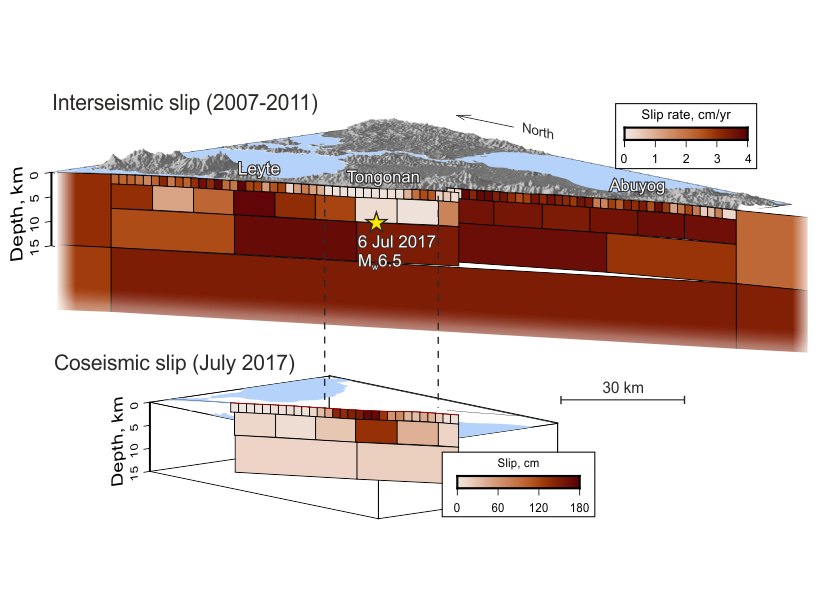Source: Journal of Geophysical Research: Solid Earth
As measurements by satellite-borne radars accumulate, it is becoming clear that aseismic slip on faults is more widespread than previously realised. Long time-series of surface displacements measured around faults with these satellites allow to constrain the distribution of such aseismic slip along faults. In turn, these observations enable investigation of the physical properties of the faults and surrounding medium that result in complex combination of aseismic and seismic slip.
Using long-time series of InSAR satellite observations, Dianala et al. [2020] provide the first probabilistic models of aseismic and coseismic slip along the Philippine Fault, on Leyte island where the fault was thought of as aseismic prior to the earthquake in July 2017. They show that most of the fault, from surface down to seismogenic depth, is slipping at close to the far-field rate of relative motion (see figure 1 above). The fault slip is thus primarily aseismic. There is an exception however, in the form of a 25-km long, fairly shallow segment, that is locked. This segment actually ruptured in 2017 producing a magnitude 6.5 earthquake. The results show that the interseismic aseismic and the 2017 earthquake slip distributions are remarkably complementary, with the 2017 earthquake “filling the gap” between aseismic segments.
The study thus reveals that earthquakes can occur on faults that are primarily slipping in an aseismic fashion (creep). The authors explore the physical reasons for such a heterogeneity in the fault slip mode. Fault geometry, heated fluids and mineral alterations are proposed as the major factors that promote properties conducive to aseismic slip while allowing local fault locking.
Citation: Dianala, J. D. B., Jolivet, R., Thomas, M. Y., Fukushima, Y., Parsons, B., & Walker, R. (2020). The relationship between seismic and aseismic slip on the Philippine Fault on Leyte Island: Bayesian modeling of fault slip and geothermal subsidence. Journal of Geophysical Research: Solid Earth, 125, e2020JB020052. https://doi.org/10.1029/2020JB020052
―Isabelle Manighetti, Editor in Chief, JGR: Solid Earth
Text © 2021. The authors. CC BY-NC-ND 3.0
Except where otherwise noted, images are subject to copyright. Any reuse without express permission from the copyright owner is prohibited.

